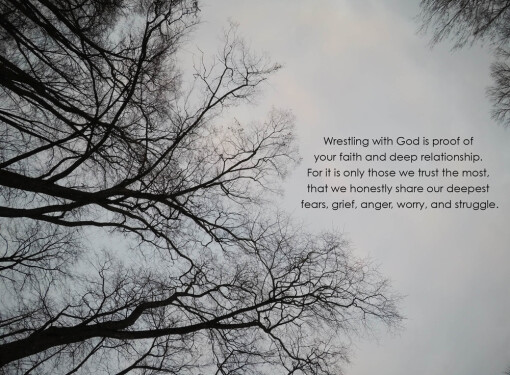
I seem to have found myself in a number of conversations recently with people who are really struggling right now. Some of it is related to the COVID-19 pandemic, some related to the racial injustice we seem to finally be facing, and others for whom these things just exacerbated struggles they were already facing. For some, they know these feelings of loneliness, anger or being overwhelmed are temporary and that this, too, shall pass. And yet others are facing a deeper spiritual struggle, wondering where God is in all this mess, wondering if God has forgotten them/us, and crying out, as the Psalmists did, “How long, O Lord?” As I struggled this week with what to write (and I’ll admit, I’m writing this about an hour before an extended deadline), two different messages about struggling with God have shown up.
The first was in book form. I love the poetry of Ann Weems and went on an Amazon shopping spree last week and bought several of her books. The first one, entitled Psalms of Lament, showed up on my porch yesterday. Did you know that nearly one half of the Book of Psalms are of lament and complaint? I do not believe this was just the people of Israel whining, but rather, they knew how to voice their pain and grief. As readers with the gift of hindsight, we might think that some of it was self-inflicted. And yet, we must remember, these were real people who were in the midst of figuring out their relationship with God – sometimes they got it right. Sometimes they got it wrong. Sound familiar?
And yet, the powerful thing for me about the psalms of lament in the Hebrew scripture is that those who were compiling the Bible as we now have it, making choices between MANY spiritual writings, kept these laments. They did not read them as whining or moments of disbelief in God, but rather somehow truly capturing our human experience and a deep relationship with God. And, Walter Brueggemann notes in the introduction to Ann Weems’ Psalms of Lament,
Oddly enough, when the need, the hurt, the demand, and the venom are fully voiced, something unexpected happens in the psalm. The mood and tone of the psalm change. Israel’s anger and protest appear to be spent, and pain characteristically moves to a positive resolution. The speaker is, at the end, confident of being heard and ‘dealt with bountifully,’ and so ends in rejoicing and praise. . . It may be that the long protest is cathartic, and enough said finally suffices. Or it may be, as many scholarly readers think, that there was in the middle of the utterance, a communal, liturgical intervention of assurance that permitted a new posture of confidence, well-being, and gratitude.
It seems that in the voicing of lament, we are not just complaining to God, but that we somehow meet God, and are transformed by it.
So, in typical fashion, I opened up Weem’s book right to the middle and it caught my breath. Her Lament Psalm Twenty-Five:
O God, what has happened to your creation?
What kind of world is this
that the innocent die?
Where is your hand
that it does not stop the killing?
How long will you watch
while the world calls you names?
How long will you wait
while the river of blood floods your streets?
Will you let the innocent die
and the guilty go free?
Will the guilty laugh cruelly
in the streets,
while the innocent lie cold
in their graves?
O God, where is your holiness
in the face of this hell?
Bind the guilty, O God,
and free the innocent
to live in your presence.
Open their graves,
and take them to your heart.
Kiss their cold lips
and let them live forever
in your eternal shalom.
O Holy God, I am stunned
that you sit by
while the innocent cry to you.
Where is your righteous anger?
Where is your powerful hand?
Why are your enemies allowed to desecrate your creation
and slaughter your children?
O God of mercy, I am on my knees!
I beg you to bring peace
out of chaos.
Divide the Red Sea once more
and save your people.
Come from your heaven
and scoop the little ones
into your arms
and hold them
against the terrors of this world.
O God of justice, stop these plagues,
and stoop to comfort your people,
for you, and only you, are our refuge.
If you are still reading, the second message I received as I wrestled with what to write this week came to me in a quote that came across my Facebook newsfeed. It is by Philip Yancy from his book Disappointment with God: Three Questions No One Asks About. “One bold message in the Book of Job is that you can say anything to God. Throw at [God] your grief, your anger, your doubt, your bitterness, your betrayal, your disappointment – [God] can absorb them all. As often as not, spiritual giants of the Bible are shown contending with God. They prefer to go away limping, like Jacob, rather than to shut God out.”
If you are struggling during this time, perhaps wrestling with God about all that is going on and feeling as if you are losing faith, my prayer for you is that you discover your wrestling with God is proof of your faith and deep relationship. For it is only those we trust the most, that we honestly share our deepest fears, grief, anger, worry, and struggle.

